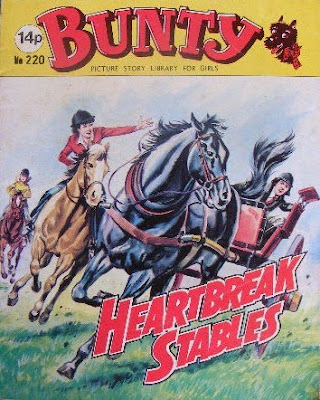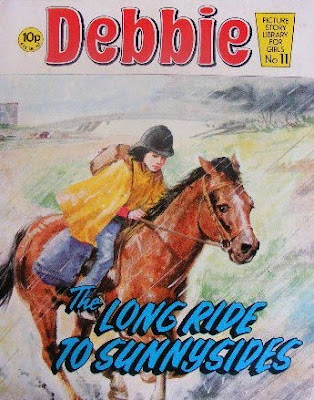The glory that is the comic story
I admit I was never much of a one for comics as a child. My sister took Bunty, and I used to flick through it. We had a couple of ancient Bunty annuals bought for us from a jumble sale. I flicked through those too if I'd read everything else within reach. I like pictures as much as the next person, but what I really like are words; tons of them - great long streams, packing out a story, and I like something I can settle into, not something that's over and done with in a few minutes.
Earlier this week I had an unexpected package. I have never grown out of the thrill of a parcel arriving in the post, which is quite convenient when your job involves you buying books (for research purposes, natch), which means parcels arriving in the post. Usually I have a pretty good idea of what's due, but I had no idea what was in the parcel that I picked up on Tuesday was, though I was intrigued, as I recognised the writing: Vanessa from Fidra's.
I opened it up, and there were five little comic books - fruit of Vanessa's recent jaunt round a boot sale. Gosh, I thought, how cute! I'd never come across any of these in the flesh, as it were, before.
 I must have edited these out and simply not noticed them when I was in shops, searching for the great god Book; surely they must have been obvious. There were hundreds of them. Both the Bunty and Judy stories I have were numbered in the 200s. Having done a bit of research in between writing the last sentence and this, I think I know why I didn't spot them. They're dated 1979-1981. I was doing A levels and at University at that point. That makes sense.
I must have edited these out and simply not noticed them when I was in shops, searching for the great god Book; surely they must have been obvious. There were hundreds of them. Both the Bunty and Judy stories I have were numbered in the 200s. Having done a bit of research in between writing the last sentence and this, I think I know why I didn't spot them. They're dated 1979-1981. I was doing A levels and at University at that point. That makes sense. These stories are classics in their own way: packed with incident isn't in it. The Long Ride to Sunnysides, within the first few pages, has Janey Perkins winning a pony in a raffle, taking it home, getting dobbed in by a nasty neighbour for keeping the pony in her council house garden; having the family threatened with eviction and then setting off to her aunt and uncle, with whom the family only exchange Christmas cards, in the hope they will give the pony a home. The ride isn't without its achievements: Janey and Cobber, in the scant 100 miles' ride, is relieved of her £10 survival money in compensation for some eaten roses; wins a Fancy Dress contest in a gymkhana (guess what the prize is); is instrumental in getting a village hall built; enables a father to stop his daughter driving a too-powerful car and then saves a film for disaster. Phew. And through it all Janey sails, calm as a cucumber, a sort of Lady Bountiful on a pony. It's really terribly impressive: what a role model. Nothing, but nothing phases her. Maybe I should have been given this before I went off to university.
In the general rush to show female competence, No Jumping for Joy reads rather oddly. The heroine, Joy stars in a terrifyingly moral work about emotional blackmail: Joy is desperate to ride, but doesn't as her mother, having broken her back in a riding accident, is convinced Joy will injure herself. Joy meets Mrs Grant, desperate for someone to ride her pony after her daughter and husband were killed before the daughter could ride in a competition. What does Joy do? Caught in this emotional maelstrom, this girl wants to please. In what becomes a very uneasy balancing act, she rides Mrs Grant's pony in secret. Nasty Dora attempts to blackmail Joy into riding badly. Joy seems to spend most of the story crying tears of misunderstood misery: she only wants to Do Good. Joy is a pretty poor role model: deception is ok as long as you're helping someone seems to be the message. Unlike Janey, she doesn't take responsibility and sort the problem out: she's curiously passive; just weeps and tries to keep everyone happy. Yuck.
I still harboured a few generally well buried thoughts about working with horses when I went to university, so it's just as well I didn't read Heartbreak Stables, in which two girls overcome the snobby rich rival riding school owners to make a success of their more lowly establishment. All the problems are easily solved with a bit of hard work and determination. I suppose it isn't the function of this sort of story to put the hard facts of getting through life in front of their readers. I hope they inspired their readers to get out there, dig their heels in and graft.
Perhaps not graft as this advert suggests: I was quite intrigued by the idea of Bunty promoting escort work (for anybody - anywhere!) How language changes. Thirty years ago Universal Escorts could appear in a girls' story without anyone (like me) putting any dodgy connotations on it.






Comments
I wonder if the pony stories from those comics (would have loved them as a kid!!) were ever published in the annuals. Most of them did feature a pony story in them.